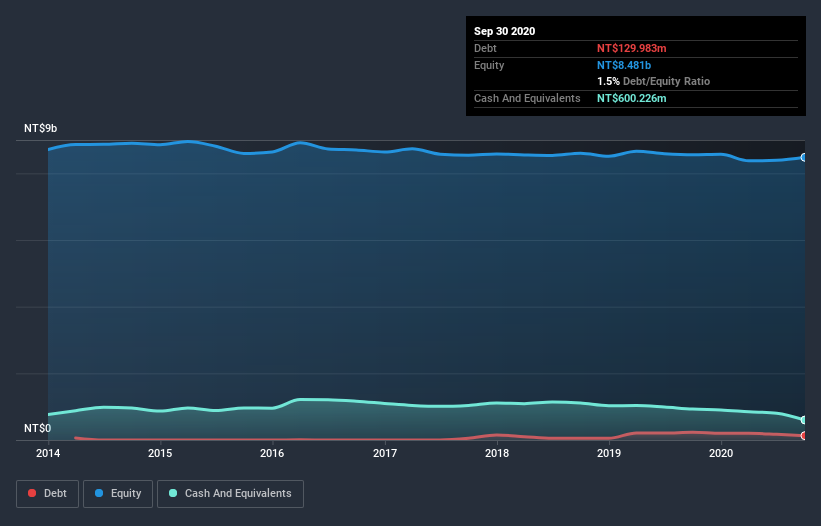Warren Buffett famously said, 'Volatility is far from synonymous with risk.' When we think about how risky a company is, we always like to look at its use of debt, since debt overload can lead to ruin. Importantly, Southeast Cement Co.,Ltd. (TPE:1110) does carry debt. But the more important question is: how much risk is that debt creating?
What Risk Does Debt Bring?
Debt and other liabilities become risky for a business when it cannot easily fulfill those obligations, either with free cash flow or by raising capital at an attractive price. Ultimately, if the company can't fulfill its legal obligations to repay debt, shareholders could walk away with nothing. However, a more usual (but still expensive) situation is where a company must dilute shareholders at a cheap share price simply to get debt under control. Of course, the upside of debt is that it often represents cheap capital, especially when it replaces dilution in a company with the ability to reinvest at high rates of return. The first thing to do when considering how much debt a business uses is to look at its cash and debt together.
See our latest analysis for Southeast CementLtd
What Is Southeast CementLtd's Net Debt?
You can click the graphic below for the historical numbers, but it shows that Southeast CementLtd had NT$130.0m of debt in September 2020, down from NT$230.0m, one year before. However, it does have NT$600.2m in cash offsetting this, leading to net cash of NT$470.2m.

How Healthy Is Southeast CementLtd's Balance Sheet?
The latest balance sheet data shows that Southeast CementLtd had liabilities of NT$530.8m due within a year, and liabilities of NT$605.2m falling due after that. Offsetting these obligations, it had cash of NT$600.2m as well as receivables valued at NT$348.0m due within 12 months. So its liabilities total NT$187.8m more than the combination of its cash and short-term receivables.
This state of affairs indicates that Southeast CementLtd's balance sheet looks quite solid, as its total liabilities are just about equal to its liquid assets. So it's very unlikely that the NT$9.77b company is short on cash, but still worth keeping an eye on the balance sheet. While it does have liabilities worth noting, Southeast CementLtd also has more cash than debt, so we're pretty confident it can manage its debt safely. There's no doubt that we learn most about debt from the balance sheet. But it is Southeast CementLtd's earnings that will influence how the balance sheet holds up in the future. So when considering debt, it's definitely worth looking at the earnings trend. Click here for an interactive snapshot.
In the last year Southeast CementLtd had a loss before interest and tax, and actually shrunk its revenue by 3.4%, to NT$1.6b. That's not what we would hope to see.
So How Risky Is Southeast CementLtd?
While Southeast CementLtd lost money on an earnings before interest and tax (EBIT) level, it actually generated positive free cash flow NT$374m. So taking that on face value, and considering the net cash situation, we don't think that the stock is too risky in the near term. Until we see some positive EBIT, we're a bit cautious of the stock, not least because of the rather modest revenue growth. When analysing debt levels, the balance sheet is the obvious place to start. But ultimately, every company can contain risks that exist outside of the balance sheet. Case in point: We've spotted 1 warning sign for Southeast CementLtd you should be aware of.
At the end of the day, it's often better to focus on companies that are free from net debt. You can access our special list of such companies (all with a track record of profit growth). It's free.
If you decide to trade Southeast CementLtd, use the lowest-cost* platform that is rated #1 Overall by Barron’s, Interactive Brokers. Trade stocks, options, futures, forex, bonds and funds on 135 markets, all from a single integrated account. Promoted
New: Manage All Your Stock Portfolios in One Place
We've created the ultimate portfolio companion for stock investors, and it's free.
• Connect an unlimited number of Portfolios and see your total in one currency
• Be alerted to new Warning Signs or Risks via email or mobile
• Track the Fair Value of your stocks
This article by Simply Wall St is general in nature. It does not constitute a recommendation to buy or sell any stock, and does not take account of your objectives, or your financial situation. We aim to bring you long-term focused analysis driven by fundamental data. Note that our analysis may not factor in the latest price-sensitive company announcements or qualitative material. Simply Wall St has no position in any stocks mentioned.
*Interactive Brokers Rated Lowest Cost Broker by StockBrokers.com Annual Online Review 2020
Have feedback on this article? Concerned about the content? Get in touch with us directly. Alternatively, email editorial-team@simplywallst.com.
About TWSE:1110
Southeast Cement
Engages in the manufacture and sale of cement in Taiwan.
Solid track record with excellent balance sheet.
Market Insights
Community Narratives



